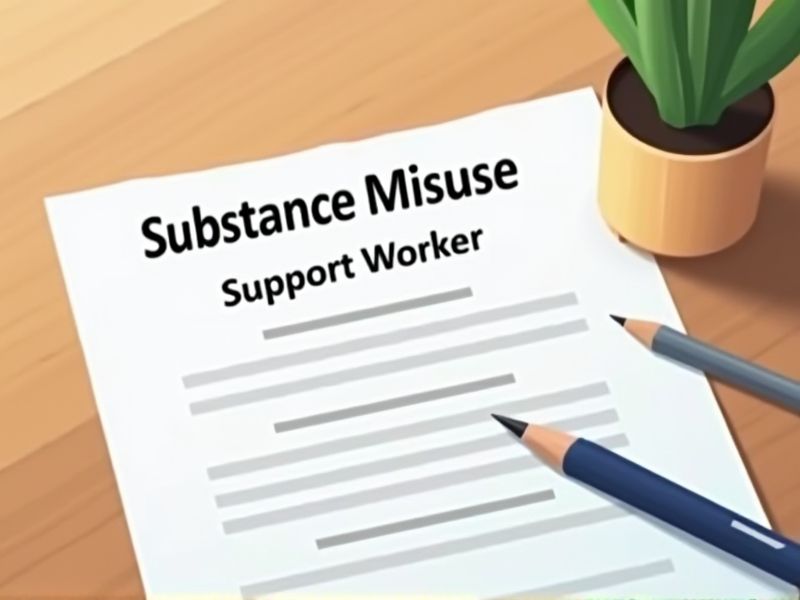
Substance Misuse Support Workers play a crucial role in helping individuals recover and maintain sobriety. Certifications are essential for these professionals as they validate expertise, ensuring evidence-based practices in treatment. Proper certification equips workers with the tools to effectively address complex addiction issues, ensuring a comprehensive approach to care. Important certifications are critical for anyone pursuing a career as a Substance Misuse Support Worker.
Certified Addiction Counselor (CAC)
Substance misuse support workers often face complex cases, and a Certified Addiction Counselor provides the specialized knowledge required to address various addiction issues effectively. CACs understand the nuances of addiction science, enabling them to develop more effective treatment plans. Access to a Certified Addiction Counselor improves the quality of care and support provided, leading to better recovery outcomes. Many regulatory and professional bodies recognize the CAC designation as a standard for competence in addiction counseling, making it integral for professional credibility.
Certified Alcohol and Drug Counselor (CADC)
A Certified Alcohol and Drug Counselor (CADC) provides essential expertise in evidence-based interventions for those struggling with substance misuse, leading to more effective recovery outcomes. With their specialized training, CADCs can assess and diagnose substance use disorders accurately, ensuring individuals receive appropriate care plans. The presence of a CADC enhances the credibility and trustworthiness of substance misuse support services, which can encourage more individuals to seek help. By offering comprehensive support, a CADC contributes to lowering relapse rates and promoting sustained recovery within the community.
Certified Substance Abuse Counselor (CSAC)
Certified Substance Abuse Counselors provide specialized knowledge and skills essential for effective substance misuse intervention. Their certification ensures adherence to evidence-based practices, enhancing treatment outcomes for individuals struggling with addiction. Their role involves assessing and developing tailored support plans, which can significantly improve recovery rates. They offer ongoing education and guidance, equipping substance misuse support workers with the tools needed to address complex cases.
Certified Peer Recovery Specialist (CPRS)
Certified Peer Recovery Specialists (CPRS) offer lived experience, which enhances relatability and trust, crucial for individuals navigating substance misuse recovery. Their specialized training equips them with strategies to foster motivation and empower clients to take actionable steps towards recovery. They often bridge gaps in traditional care by offering continuous, empathetic support that aligns with an individual's unique journey. The presence of CPRS can lead to improved outcomes, including higher retention rates in recovery programs and decreased relapse incidents.
Crisis Intervention Training (CIT)
Substance misuse support workers often encounter clients in crisis, so crisis intervention training equips them with skills to de-escalate potentially volatile situations safely. High-stress scenarios frequently arise due to substance misuse, leading to unpredictable behavior that trained workers can manage more effectively. Crisis intervention training can reduce the risk of harm for both clients and workers by improving communication and conflict resolution skills. This training enhances the worker's ability to connect clients to appropriate resources, aiding in faster recovery and better long-term outcomes.
Mental Health First Aid Certification
Substance misuse support workers frequently encounter clients experiencing mental health challenges, often interconnected with substance use issues. Mental Health First Aid Certification equips these workers with essential skills to identify and respond to mental health crises, enhancing their ability to provide effective support. This training empowers workers to offer immediate help and guide clients toward appropriate professional resources. Possessing this certification improves the overall quality of care, reducing potential risks and promoting better recovery outcomes.
Trauma-Informed Care Certification
Trauma-informed care certification equips substance misuse support workers with an understanding of how past trauma can influence addictive behaviors. This knowledge enables them to create safe environments that do not re-traumatize individuals seeking help. Certified workers are more adept at recognizing signs of trauma, which can enhance treatment outcomes and client trust. With this certification, workers can tailor interventions to be more empathetic and effective, addressing underlying issues alongside substance misuse.
Motivational Interviewing Certification
Obtaining a Motivational Interviewing Certification equips Substance Misuse Support Workers with effective communication techniques, improving client engagement and outcomes. Certification provides workers with validated skills, enhancing their credibility and professional development in the field. Training in this approach fosters a client-centered environment, aiding in reducing resistance and promoting behavior change. Employers often seek certified professionals to ensure quality care and maximize treatment effectiveness.
CPR and First Aid Certification
Substance misuse support workers frequently encounter emergency situations, making CPR and First Aid certification essential to effectively respond and potentially save lives during crises. The certification equips them with the skills to manage overdoses or other health emergencies associated with substance use. With proper training, they can also provide immediate care until professional medical help arrives, bridging a critical gap in emergency response. Employers often require these certifications to ensure that staff are prepared to handle the intense and unpredictable nature of the work environment.
Certified Co-occurring Disorders Professional (CCDP)
Certified Co-occurring Disorders Professional (CCDP) is needed for Substance Misuse Support Workers because they ensure an integrated approach to treating individuals with both mental health and substance use disorders. This certification equips workers with specialized knowledge to address overlapping symptoms, improving client outcomes. A CCDP enhances the quality of care by promoting tailored interventions that consider both mental health and substance use needs. Furthermore, possessing a CCDP can lead to greater trust and credibility among clients and colleagues, fostering a more supportive treatment environment.
Summary
When you, as a Substance Misuse Support Worker, obtain certifications, your employability and credibility significantly increase. You can expect improved skills in handling complex cases, leading to better client outcomes. This often results in higher job satisfaction and potential for career advancement. Employers tend to value certified professionals, seeing them as committed and knowledgeable assets to their team.
